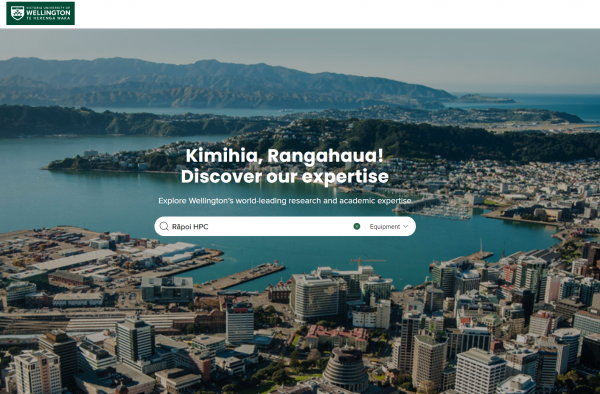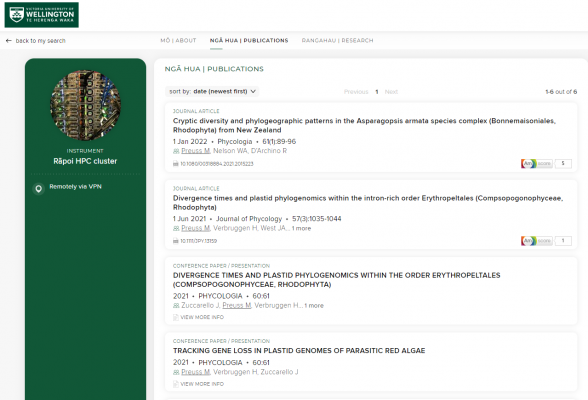A New Zealand university has become a leader in demonstrating its research expertise, equipment and facilities – and it’s building a stronger research community along the way.
In the Māori language, the word “rāpoi” means to “cluster” or to “gather together”. It just so happens that a high-performance computing cluster (HPC) at Te Herenga Waka — Victoria University of Wellington (Te Herenga Waka) is named the Rāpoi HPC, and – perhaps by a happy coincidence – it’s become one of the star attractions of that university’s new showcase of research equipment, capabilities and expertise.
Over the past couple of years, Te Herenga Waka in the nation’s North Island capital of Wellington has been working closely with Symplectic and its own research community to “gather together” what is now among the world’s most impressive – and publicly searchable – collections of resources at any university available for research and consultancy.
Human resources (expertise) and infrastructure resources (equipment, facilities and services) are now all discoverable at Wellington’s university’s portal, which is powered by Symplectic: https://people.wgtn.ac.nz/

Sheila Law, Research Information Systems Administrator with Te Herenga Waka’s Research Office, says having earlier built a showcase of the university’s academic expertise through new, searchable staff profiles, the next challenge was to tackle its infrastructure.
“The aim was to create a searchable catalogue of specialist equipment, to showcase our state-of-the-art capabilities, which could be used to support external engagement and facilitate long-lasting collaborations with other researchers,” Sheila says.
But until work began in late 2021, there was no central location or asset register of equipment to refer to. “All the information was held in institutes and schools and centres, with no overview of the resources that we had.”
Kate Byrne, VP Product Management with Symplectic, says: “We’ve found from working with organisations around the world that although many of them have data of this kind, it is very fragmented. And so one of the things we’ve been looking at most is to help some of our clients to start thinking about the early stages of that journey, because it’s very easy to look at our tools and go: isn’t this shiny, it would be great to do that. But actually stepping back and looking at where that data is going to come from, and how you’re going to work with your community to enable it, is part of the challenge,” Kate says.
Wellington’s university was up to the challenge. The small project team worked closely with school managers and technical managers, and with the assistance of internal champions, they gathered all the data needed, arranged for photos to be taken, and identified four categories under which equipment could be clustered: software, instruments, database, and services.
While the data gathering and entry was painstaking, the result is that Wellington’s university now has a central register with 300 pieces of equipment on show both internally and externally. The portal is notable for its data completeness and quality, and provides images to help demonstrate its equipment and facilities.
Sheila says the university’s staff responded to the finished product straight away. “As soon as we launched it, we started to get interest from areas where they were seeing the potential in it.
 “There was one – the Rāpoi – it’s a sort of computer data hub, which is available for anybody across the university to use. It was great to get that on there. And as soon as that was available, the staff that were using it wanted to link to it from their personal profiles. So that was nice to see – that was our first proof that people are liking this, and now they can see how useful it is, that they can actually show the full capability of their expertise and the resources they have available to them.”
“There was one – the Rāpoi – it’s a sort of computer data hub, which is available for anybody across the university to use. It was great to get that on there. And as soon as that was available, the staff that were using it wanted to link to it from their personal profiles. So that was nice to see – that was our first proof that people are liking this, and now they can see how useful it is, that they can actually show the full capability of their expertise and the resources they have available to them.”
Since its launch earlier this year, Wellington’s university’s equipment website has also gathered interest from staff in New Zealand government departments, who are currently working on a solution for a National Research System.
Symplectic has been with Te Herenga Waka every step of the way. “How Wellington’s university has approached this challenge and developed such a successful outcome should become a showcase example to other institutions. It’s been a pleasure working with them,” Kate says.
Sheila says the University’s staff have been critical to the project’s success. “One of our key learnings is how we engage with staff to ensure they become the experts in using the system, and managing the categories and resources that they need to optimise the curation of research activities.
“By providing ongoing support, we increase the understanding and build confidence in using the system, and we also seek and receive feedback from those users to understand how they’re using the system, and also how they would wish to use it.”
The concept of “gathering together” – of information and the research community – is ongoing:
“We continue to look at ways in which we can enhance our profiles further, to create a one-stop ecosystem of interconnected research activities. We continue to explore and test new functionality as it’s made available, to see how we can reduce manual effort, to curate a rich and versatile research ecosystem, to build our reporting capability, and to help researchers expand their research opportunities and find new collaborators.”
For more information about Symplectic’s Discovery module and Public Profiles: www.symplectic.co.uk/public-profiles